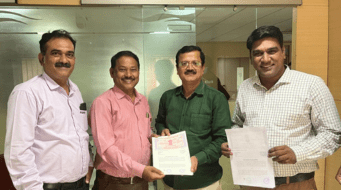by Arjuna Srinidhi, WOTR Centre for Resilience Studies (W-CReS)
In recent years, India has experienced a rise in extreme weather events. In 2018 alone, climate-related hazards, including heat waves, storms, floods, and droughts, caused more than two thousand deaths, with associated economic losses estimated at USD 37.8 billion.
Approximately half of India’s land surface is characterised as dryland, making it particularly vulnerable to climate-induced fluctuations in temperature and rainfall patterns. With one-quarter of India’s drought-prone districts located in Maharashtra, the state is particularly hard hit. Moreover, nearly 92% of its geographical area covered by hard rock, which further limits the availability of groundwater. Farmers are forced to exploit the available water sources, which in turn further depletes the already fragile aquifer stocks. Ultimately, this threatens the sustainability of the agricultural economy.
In response to this threat, Maharashtra has embarked on a number of initiatives, in partnership with civil society organisations and international partners, to address the issues of drought and water scarcity in a more comprehensive and integrated way.
This blog outlines one such initiative, implemented by a partnership between Watershed Organisation Trust (WOTR) and TMG Research. Launched in 2019, the project aims to introduce an ecosystem-based adaptation (EbA) approach, as a holistic process that can help contribute to both intended Nationally Determined Contributions (NDCs), and Sustainable Development Goals (SDGs). The proposed processes will be implemented through participatory, multi-stakeholder dialogues at local and state levels.

In addition to being one of the most drought-prone states, Maharashtra provides an ideal opportunity for introducing a comprehensive EbA approach, for a number of reasons:
- Farming in many parts of the state is already highly vulnerable to climate change, as evidenced in reports of farmers in distress and a high rate of farmer suicides.
- The state has a history of implementing progressive drought mitigation, and natural resource management programmes. One such initiative is the Indo-German Watershed Development programme, where agencies like NABARD and WOTR were involved.
- WOTR, along with support from NABARD and the Swiss Agency for Development Cooperation (SDC), also implemented one of India’s pioneering Climate Change Adaptation It involved a number of innovative actions, like locale-specific weather based farm advisories, crop planning based on water-budgeting, people’s biodiversity registers, and package of practices for climate resilient agriculture emerged.
As India seeks to align its development with international goals related to climate and sustainability, nature-based and human-centred approaches like EbA will also bring in much needed synergies with the Paris Climate Agreement and the United Nations Agenda 2030 for Sustainable Development.
Currently in its first phase, the Climate-SDG Integration project is exploring opportunities for linking innovative and progressive adaptation projects in the state with existing, or proposed, government programmes and policies.
The project aims to demonstrate how a roadmap for scaling EbA in Maharashtra, derived through multi-stakeholder engagement, can be mainstreamed across India and to potentially other countries with similar develop contexts.
 A recently published paper, titled, “Scaling Ecosystem-based Adaptation in Maharashta, India: An Analysis of Policies and Programmes,” identifies a number of opportunities for scaling-up EbA actions in the state. These include: national and state commitments related to the Paris agreement on climate change; India’s monitoring of the SDGs, through the SDG India Index;Maharashtra’s Biodiversity Strategic Action plan; and several commitments of non-state actors, such as private sector CSR obligations.
A recently published paper, titled, “Scaling Ecosystem-based Adaptation in Maharashta, India: An Analysis of Policies and Programmes,” identifies a number of opportunities for scaling-up EbA actions in the state. These include: national and state commitments related to the Paris agreement on climate change; India’s monitoring of the SDGs, through the SDG India Index;Maharashtra’s Biodiversity Strategic Action plan; and several commitments of non-state actors, such as private sector CSR obligations.
The project will also document case studies that highlight EbA initiatives, their impacts and benefits to communities, and lessons learned during implementation. Once completed, diverse stakeholders in the state, including policy makers, the private sector, researchers, and farmers, will be invited to discuss the findings, and identify strategies and opportunities for scaling-up EbA actions in Maharashtra. The outcome of these stakeholder dialogues, as well as interactions with communities at the case-study sites, will also provide input for developing a road map for scaling-up EbA in the state.
This is the first of a series of blog posts highlighting ecosystem-based adaptation initiatives in Maharashtra, India, and beyond, in the context of the Climate-SDG Integration project
—
For more information about our work on Ecosystem-based Adaptation in Maharashtra visit our project website:https://www.tmg-thinktank.com/iki and watch our short movie on “Creating an enabling environment for upscaling of Ecosystem-based Adaptation”: https://youtu.be/b1I0A_DgU6c
To engage in our discussions on upscaling ecosystem-based adaptation and follow our work in general, follow us on twitter: @WOTRIndia and @tmg_think.
Contact: info@wotr.org
Disclaimer: The“Climate-SDG Integration Project -Supporting the implementation of the Paris Agreement and the 2030 Agenda through Ecosystem-based Adaptation”is part of the International Climate Initiative and financed by the German Federal Ministry for the Environment, Nature Conservation and Nuclear Safety (BMU).





